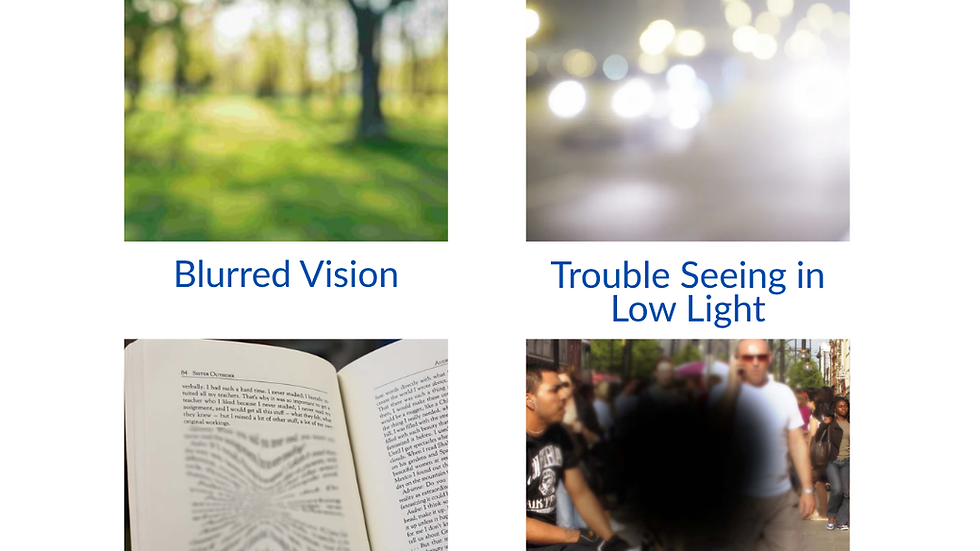Understanding Macular Degeneration: Early Signs and Solutions
- Miss Shakti Thakur

- Jun 2, 2025
- 3 min read
Updated: Aug 7, 2025
Macular degeneration, especially in its early stages, often develops without noticeable symptoms. These subtle visual changes can signal significant retinal damage. As a leading cause of vision impairment in individuals over 55, early detection of age-related macular degeneration (AMD) is crucial.
Drawing from two decades of clinical expertise in Medical Retina, this article explains the early signs of AMD, how to recognize them, and when to seek a specialist opinion.
What Is Macular Degeneration?
Macular degeneration is a chronic, progressive condition that affects the macula. The macula is the central part of the retina responsible for detailed visual tasks. The two primary forms include:
Dry AMD: Characterized by gradual thinning of the macula over time.
Wet AMD: Defined by abnormal blood vessel growth under the retina, leading to rapid vision loss.
Learn more about macular degeneration and its impact on vision: https://www.eyemedics.co.uk/macular-degeneration
The Earliest Signs of Macular Degeneration
Identifying early-stage AMD improves the chances of managing the disease effectively.

Key symptoms include:
Blurred Central Vision: Subtle central blurring may first appear when reading fine print or recognizing faces. It is often dismissed as an age-related vision change, delaying appropriate care.
Trouble Seeing in Dim Light: Struggling to adapt to low-light environments may indicate early retinal dysfunction associated with AMD.
Distorted Vision (Metamorphopsia): When straight lines appear wavy or distorted, the structural integrity of the macula may be compromised. This symptom is an early indicator warranting immediate attention.
Diminished Color Brightness: Loss of vibrancy or brightness in colors, especially in the central visual field, is another sign of macular degeneration impacting photoreceptor cells.
Blank Spots or Shadows: The presence of shadows, smudges, or small blank areas in central vision can signal advancing Dry AMD. These spots may increase in size over time.
Why AMD Symptoms Are Often Missed
AMD typically progresses without pain and can affect each eye differently. One eye may compensate for the other, masking early signs. Many individuals adapt their behavior until significant vision changes emerge. At this point, damage may already be advanced.
How AMD Is Diagnosed
Diagnosis involves a series of retinal assessments. These may include:
Optical Coherence Tomography (OCT)
Visual acuity testing
Amsler grid testing for visual distortions
High-resolution retinal imaging
Treatment Options for Early AMD
While Dry AMD currently has no cure, recent technological advances have led to promising therapies that can slow its progression. Photobiomodulation therapy, such as Valeda Light Therapy, uses low-level light to stimulate cellular activity in the retina. This promotes mitochondrial function and reduces inflammation.

Lifestyle Strategies to Slow Progression
In addition to treatment, certain lifestyle modifications can support retinal health:

A diet high in leafy greens and omega-3s
Smoking cessation
Monitoring blood pressure and cardiovascular health
Know more about the benefits of added vitamins (AREDS/AREDS2) in AMD: https://www.eyemedics.co.uk/post/what-are-the-benefits-of-added-vitamins-areds-areds2-in-amd.
When to See a Specialist for Macular Degeneration
Anyone over the age of 50 who experiences the symptoms outlined above should consult a retinal specialist promptly. Delays in diagnosis can lead to irreversible damage, especially if Wet AMD develops.
Solutions and Support for Macular Degeneration
For those seeking expert evaluation, guidance, or advanced therapies such as Valeda Light Therapy, EyeMedics provides specialist care tailored to the needs of AMD patients. Led by Consultant Ophthalmologist Miss Shakti Thakur, the clinic combines experience, research-backed protocols, and patient-centered treatment strategies.
Book a consultation: https://www.eyemedics.co.uk/contact.
Frequently Asked Questions About Macular Degeneration
Q: Can AMD be reversed?
A: While irreversible, its progression can be significantly slowed if caught early.
Q: Does AMD cause complete blindness?
A: No. AMD affects central vision but generally spares peripheral vision.
Q: Is Valeda Light Therapy widely available?
A: It is offered by select clinics with specialized retinal services. A clinical assessment is necessary to determine suitability.
Further Reading
Disclaimer
The information provided in this article is intended for general educational purposes only and does not constitute medical advice, diagnosis, or treatment. Always seek the advice of a qualified eye care professional or medical specialist with any questions you may have regarding medical conditions. Never disregard professional medical advice or delay in seeking it because of something you have read on the EyeMedics website. Individual results and treatment outcomes may vary. If you are experiencing symptoms related to your vision, please consult a qualified healthcare provider promptly.
Author Bio
Miss Shakti Thakur is a Consultant Ophthalmologist with nearly two decades of experience in Medical Retina. Specializing in macular degeneration and diabetic eye disease, she prioritizes personalized patient care and evidence-based treatments.




Comments